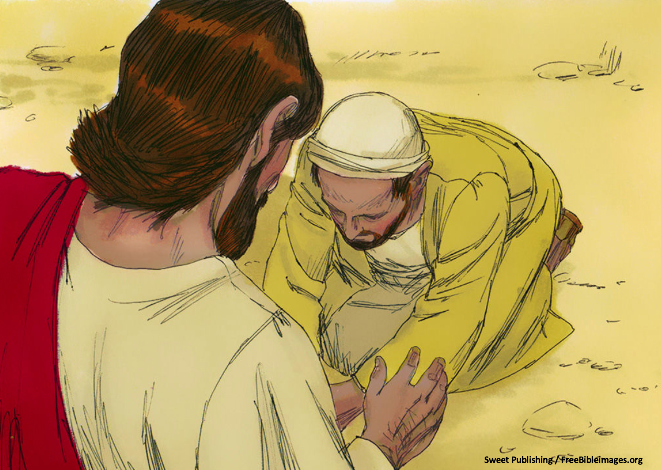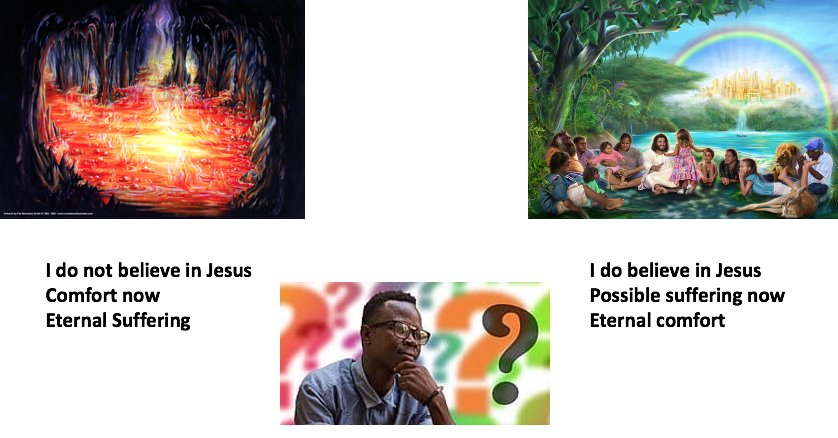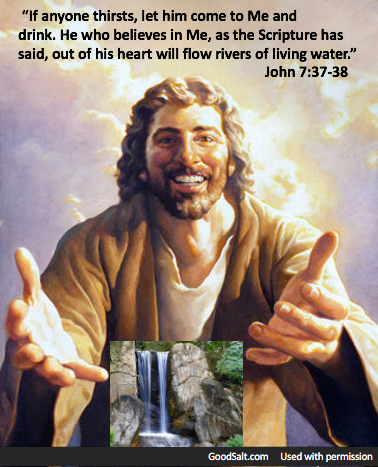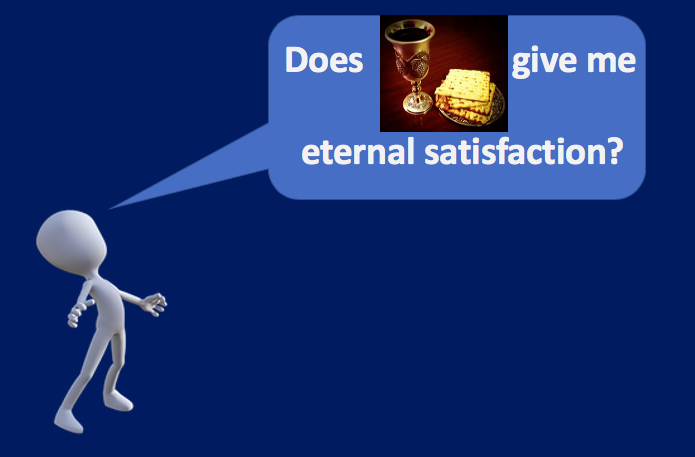“My sheep hear My voice, and I know them, and they follow Me.” John 10:27
A second way I can experience security forever is when I BELIEVE IN JESUS ALONE FOR HIS FREE GIFT (John 10:27). Jesus said to His Jewish audience, “My sheep hear My voice, and I know them, and they follow Me.” (John 10:27). What characterized those Jesus called “My sheep” was that they listened to His voice. By listening they gave the response of faith to His words and works.
This reminds me of a true story about a man in Australia who was arrested and charged with stealing a sheep. But he claimed emphatically that it was one of his own that had been missing for many days. When the case went to court, the judge was puzzled, not knowing how to decide the matter. At last, he asked that the sheep be brought into the courtroom. Then he ordered the plaintiff to step outside and call the animal. The sheep made no response except to raise its head and look frightened. The judge then instructed the defendant to go to the courtyard and call the sheep. When the accused man began to make his distinctive call, the sheep bounded toward the door. It was obvious that he recognized the familiar voice of his shepherd. “His sheep knows him,” said the judge. “Case dismissed.”
Jesus’ sheep are intimately known by their Shepherd. You might have expected Jesus to go on to say, “and they know Me.” But He did not. It is the knowledge that Jesus has of His sheep that is the important thing. Because Jesus knows His sheep they are drawn to Him. They trust the One who cares enough to know them.
When Jesus says, “and they follow Me,”some insist this means if a person truly believes in Christ he perseveres in discipleship or obedience to Christ. They say that a true Christian will continue to obey Jesus the rest of His life. But the context does not support this understanding. Jesus is using the word “follow” as a figure of speech referring to belief. Just as Jesus’ reference to sheep, is a figure of speech, so His reference to following Him is the same. Christ was not talking about literal sheep which physically follow a literal shepherd in this verse. Instead He was illustrating salvation by picturing Himself as the Good Shepherd and believers as His sheep (cf. John 10:1-27).
In the context, Jesus addresses the unbelief of His Jewish audience, who questioned if He was the Messiah (John 10: 24). Jesus replied to them, “I told you, and you do not believe. The works that I do in My Father’s name, they bear witness of Me. But you do not believe because you are not of My sheep, as I said to you.” (John 10:25-26). People who are not of His sheep do not believe. What then do His sheep do? They believe He is the Christ – the One who gives eternal life to those who believe in Him. They hear His voice and respond in faith like sheep follow a shepherd (cf. John 10:4-5). They trust Him. So in this context the unbelief of His Jewish audience (John 10:25-26) is set in contrast to His sheep following or believing in Him (John 10:27).
Bob Wilkins writes that “the picture of sheep hearing their shepherd’s voice and following him is a picture of childlike faith. In his book The Gospel Under Siege, Zane Hodges says concerning that illustration, ‘That is to say, they [the sheep] commit their safety and well-being to the Shepherd who has summoned them to do so‘ (p. 44). He goes on to say that this is clearly an act of faith, not discipleship.
“Hodges points out two other points which further prove that the figure refers to faith in Christ: the sequence of the coordinate clauses and the analogy of John 5:24.
“The verses in question have five clauses joined by the word and. A definite progression is evident. The sequence of the clauses shows that ‘following Him’ is the condition—not the consequence—of eternal life. Jesus did not say, ‘I give them eternal life and they follow Me.’ Instead He said, ‘They follow Me and I give them eternal life.’ Since faith in Christ is the sole condition of salvation in Scripture and in John’s Gospel, ‘following Him’ must be a figure for faith in Christ.
“In addition, John 5:24 is parallel to John 10:27-28. Both refer to hearing, believing, the giving of eternal life, the guarantee against eternal judgment, and the promise of the permanence of the relationship. The only difference between the two verses is that in John 10:27 believing is expressed by means of the figure of sheep following a shepherd.” 1
Throughout the gospel of John, figures of speech are used to illustrate saving faith such as receiving (1:12; 5:43; 13:20), looking (3:14-15), drinking (4:14; 7:37), hearing (5:24; 10:16, 27), coming (5:40; 6:35, 37, 44, 65; 7:37), eating bread (6:50, 51, 53, 54, 56, 58), entering (10:9), and following (10:27). Christian author Charlie Bing writes: “These pictures of faith all denote receptivity, agreement, or trust. All are essentially simple activities and essentially passive. None communicates the idea of merit, work, effort, or achievement. Neither do they communicate an exchange of one’s life or the ongoing submission of one’s life to Jesus as Master in order to obtain eternal life.” 2
However, following Christ through obedience is necessary to be a disciple of Christ (Mark 1:17-18; Luke 5:10-11; 9:23), not a possessor of Christ. For example, Jesus did not call His disciples to follow Him as His disciples (Mark 1:14-18) until about a year after they believed in Him (John 1:35-2:11).
When you examine all four gospels, it becomes clear that the disciples whom Jesus called to follow Him in Mark 1:16-18 were already believers. In the Spring of A.D. 26 Peter, John, Philip and Andrew met Jesus for the first time (John 1:35-51) and believed in Him. When Jesus invited Philip to follow Him (John 1:43), He was asking him to accompany Him to Galilee, not make a discipleship commitment. Philip trusted in Christ because of spending time with Him (1:45).
Four days after that first encounter, Jesus’ other disciples believed in Him after He turns water into wine (2:1-11). Several days later during the Passover Feast in Jerusalem, Jesus cleanses the temple (2:13-22). During the next several months, Christ instructs these new believers in the fundamental truths of salvation and assurance as He evangelizes Nicodemus, the Samaritan woman, and the city of Sychar (John 3-4). John 4:35 mentions 4 months until harvest. The harvest takes place in the months of April or May. Four months prior would be January or February. Thus, between the mention of the first Passover (John 2:13) which is in April, and the time mentioned here (John 4:35), almost one year has passed. During these months, John the Baptist is evangelizing Judea (John 3:22-36) and baptizing. So, several things have already taken place before we come to Mark 1.
Mark 1:14 informs us that John the Baptist is now in prison. In John 1-3, John the Baptist is still ministering publicly. Now, we see that he is in prison in Mark 1. So, these disciples have known Jesus for at least a year when Christ approaches them in Mark 1:16. Peter is a believer. He has evangelized the city of Sychar with Christ. But now he is fishing for fish.
The gospel of John distinguishes the freeness of salvation (John 4:10-14) from the costliness of discipleship (John 8:31-32). The only condition for everlasting life is belief in Jesus Christ alone for His free gift (John 3:14-18, 36; 4:10-14; 5:24; 6:40, 47; 7:37-39; 11:25-27; 20:31), but there are many conditions for discipleship including following Christ (John 8:12; 12:24-26; 21:19-22), abiding in Jesus’ word (John 8:31-32), loving one another (John 13:34-35), and bearing fruit (John 15:1-8).
The apostle John uses the word “believe” ninety-nine times in his gospel. 3 The word “believe” means to be convinced that something is true, and then trust in that something. Trusting in Jesus is like riding on an airplane. When you ride on an airplane, do you need to push the plane to get it off the ground? No, of course not. Do you need to flap your arms to keep the airplane in the air? Absolutely not. All you must do is trust a person, your pilot, to take you to your destination. In the same way, the gospel of John invites non-Christians to trust in Jesus Christ alone through no effort of your own for His gift of everlasting life. The moment you do, Jesus guarantees you have everlasting which can never be lost (John 10:28-29). Your eternal security is not based upon your good works or your faithfulness, but upon Jesus’ finished work on the cross and His faithfulness to His promise. That is security that lasts forever!!!
Prayer: Lord Jesus, You are the Good Shepherd Who laid down His life for the sheep. Like a sheep that hears the voice of its shepherd and trusts him for its safety and security, so You are my Good Shepherd. The moment I heard Your voice say to me when I was nineteen years of age, “Most assuredly, I say to you, he who hears My word and believes in Him who sent Me has everlasting life, and shall not come into judgment, but has passed from death into life,” I believed or trusted in You alone to give me Your gift of everlasting life. You guaranteed then that I had everlasting life and that I would never be judged for my sins. My relationship with You is permanent because I had passed from death into life. You gave me security that can never be taken away from me! That security is not based on my faithfulness, but on Yours to keep Your promises to those who believe in You. Thank You so much my Lord and my God. I worship You for Who You are and what You have done for me. In Your name. Amen.
ENDNOTE:
1. Dr. Bob Wilkin, “Is Following Christ a Condition of Eternal Life?” Grace in Focus (Grace Evangelical Society, April 1990).
2. Dr. Charlie Bing, “The Condition For Salvation In John’s Gospel,” Journal Of The Grace Evangelical Society, Vol. 9:16, (Spring 1996): 31.
3. John 1:7, 12, 50; 2:11, 22, 23; 3:12(2), 15, 16, 18(3), 36(2); 4:21, 39, 41, 42, 48, 50, 53; 5:24, 38, 44, 46(2), 47(2); 6:29, 30, 35, 36, 40, 47, 64(2), 69; 7:5, 31, 38, 39, 48; 8:24, 30, 31, 45, 46; 9:18, 35, 36, 38; 10:25, 26, 37, 38(3), 42; 11:15, 25, 26(2), 27, 42, 45, 48; 12:11, 36, 37, 38, 39, 42, 44(2), 46, 47; 13:19; 14:1(2), 10, 11(2), 12, 29; 16:9, 27, 30, 31; 17:8, 20, 21; 19:35; 20:8, 25, 29(2), 31(2).











